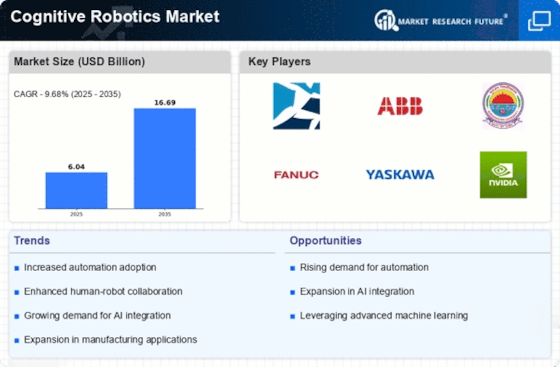Top Industry Leaders in the Cognitive Robotics Market

The Competitive Landscape of Cognitive Robotics Market
The cognitive robotics market is where logic meets learning, where machines mimic the human mind to tackle complex tasks. Understanding the strategies adopted by market leaders, the factors influencing market share, the influx of innovative startups, and the overall competitive landscape is crucial for navigating this dynamic and fascinating space. The cognitive robotics market is a vibrant and dynamic space brimming with opportunities and challenges.
Key Player:
- Cognitive Operational Systems, Inc.
- Haapie SAS
- KinderLab Robotics
- Tinybots
- BKIN Technologies Limited
- U. Robots Limited
- Behaviour Labs SRL
- Heron Robots SRL
- Perceptronic Solutions Inc.
- Cognitive Spring
Strategies Adopted by Leaders:
- Technology Prowess: iRobot and SoftBank Robotics prioritize advanced AI algorithms, robust learning capabilities, and autonomous navigation, setting the benchmark for intelligent and adaptable robots.
- Vertical Specialization: Boston Dynamics excels in developing robots for hazardous environments, while Teradyne focuses on high-precision robots for electronics manufacturing, showcasing the advantage of catering to specific industry needs.
- Ecosystem Building: Amazon's Kiva robots seamlessly integrate with its warehouse automation systems, demonstrating the power of building a comprehensive robotics ecosystem.
- Open-Source Platforms: Robotis and Clearpath Robotics offer customizable robot platforms and software kits, empowering developers and researchers to accelerate innovation.
- Cost Leadership: Chinese manufacturers like DJI leverage lower production costs and economies of scale to offer affordable cognitive robots for consumer and commercial applications.
Factors for Market Share Analysis:
- Technology Leadership: Companies with superior AI algorithms, learning capabilities, and autonomous navigation features command premium prices and secure market share by offering robots that handle complex tasks efficiently.
- Safety and Security: Rigorous compliance with safety regulations and robust cybersecurity measures are crucial for gaining customer trust and market access, particularly in sensitive sectors like healthcare and defense.
- Deployment and Integration: Ease of deployment, seamless integration with existing infrastructure, and user-friendly control interfaces are critical for widespread adoption, especially in non-tech-savvy environments.
- Cost and ROI: Balancing affordability with performance and demonstrating clear return on investment are crucial for convincing businesses to invest in cognitive robots.
- Regional Focus: Adapting to regional regulations, language barriers, and cultural preferences is essential for successful market penetration in different geographies.
New and Emerging Companies:
- Startups like Agility Robotics and Fetch Robotics: These innovators focus on developing agile, human-like robots for logistics and service applications, challenging established players by offering next-generation capabilities.
- Academia and Research Labs: MIT's CSAIL and Carnegie Mellon University's Robotics Institute lead the way in advancements like soft robotics and collaborative manipulation, shaping the future of cognitive robotics technology.
- Sensor and Software Developers: Companies like Velodyne and RealSense develop advanced LiDAR and vision sensors, while startups like PickNik offer cutting-edge robotics software, influencing core technologies in the cognitive robotics market.
Industry Developments:
Boston Dynamics:
- Dec 2023: Unveiled Spot Flex, a smaller and more agile version of its Spot robot, targeted for inspection and surveillance tasks.
-
Oct 2023:Announced partnership with Hyundai Motor Group to develop and commercialize logistics robots.
Soft Robotics:
- Nov 2023: Released a new line of soft robotic grippers capable of handling delicate objects with human-like dexterity.
-
Jul 2023:Secured funding to expand its production capacity and meet growing demand for its soft robot technology.









